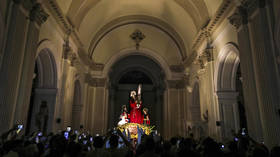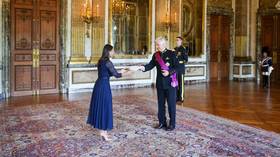Vatican embassy shut down in Central American nation

The Vatican's chargé d’affaires left Nicaragua on Friday, the Holy See said, following the closure of its embassy at the government’s request. Earlier this month, Pope Francis made harsh comments with respect to the Nicaraguan leadership over its treatment of the Catholic Church.
In an article published on Saturday, Vatican News reported that Monsignor Marcel Mbaye Diouf had moved to neighboring Costa Rica
On Monday, Nicaragua’s Foreign Ministry announced that it had suspended diplomatic relations with the Vatican, asking that it shut down its mission in the country.
Last week, the Holy See had expressed “deep concern about the upsurge of violence across the country, and the shrinking of space for dialogue and negotiations between authorities and civil society in recent years.”
The Vatican’s representatives called for the resumption of dialogue between various political forces in Nicaragua and the “return to a peaceful coexistence.”
Meanwhile, speaking to online outlet Infobae last Friday, Pope Francis himself suggested that Nicaraguan President Daniel Ortega is “mentally unbalanced.”
The pontiff went on to compare his government to the “1917 communist dictatorship, or the 1935 Hitlerite dictatorship.”
Francis cited the 26-year-long sentence handed down to Catholic Bishop Rolando Alvarez last month by a Nicaraguan court on charges of undermining the government, spreading false information, obstruction of functions and disobedience
He was among several hundred individuals who authorities in Managua branded as traitors and stripped of citizenship for “committing acts that undermine independence, sovereignty, and self-determination of the people, and for inciting violence, terrorism, and economic destabilization.”
While 222 of those people were subsequently deported to the US, Alvarez refused to board the plane and ended up behind bars.
Relations between the Catholic church and Nicaraguan government have been on a downward trajectory since mass protests began back in 2018.
Ortega was quick to blame the US involvement for the unrest, insisting that the opposition was attempting to stage a coup. His government subsequently banned all political rallies.
The Nicaraguan president described Catholic clergymen who had sheltered protesters or sympathized with them, as “terrorists,” with dozens of religious figures being jailed.













